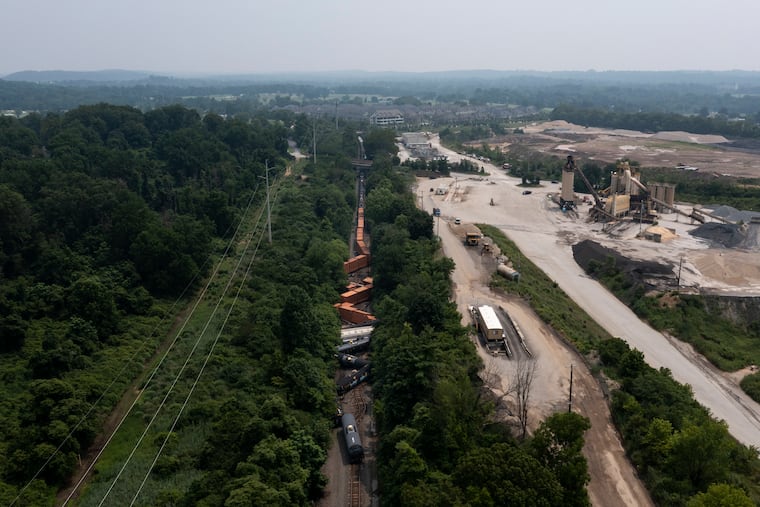Whitemarsh train derailment likely caused by sinkhole, Norfolk Southern says. Here’s what we know.
A preliminary investigation points to a sinkhole as the cause of the derailment.

Shortly before 5 a.m. Monday, a westbound CSX freight train derailed in Whitemarsh Township, Montgomery County. Fifteen cars of the 40-car train derailed on the line owned by Norfolk Southern. Twelve homes in the area were briefly evacuated, and no injuries were reported. CSX and Norfolk Southern are among the six largest railroad operators in the nation.
Where did the train derail?
What caused the derailment?
“Our preliminary investigation indicates a sinkhole as the cause of the derailment,” Connor Spielmaker, a spokesman for Norfolk Southern, said Tuesday. “We’ll continue investigating with CSX and the FRA [Federal Railroad Administration]. We completed the wrecking of the derailed cars this morning, and track repairs are in progress.”
Train derailments aren’t as rare as some might imagine. The FRA’s Office of Safety Analysis reported 1,211 derailments in 2022 across the country — that’s a little more than three times a day for all sizes of railroad, both freight and passenger. But most don’t get much public notice because they occur at low speeds and cause few injuries. In 2022, 76% of the derailments that the six largest railroad operators experienced were in train yards at speeds of 5 mph or slower.
What spilled when the train derailed?
When the train derailed, plastic pellets spilled out of a tear in a 190,000-pound hopper car onto the ground. The pellets are not dangerous. As of Tuesday, nothing else has spilled from the train, according to Norfolk Southern officials. The train was also carrying urea, a fertilizer that can be used to make plastic products, and tetrachloroethylene.
What is tetrachloroethylene?
One of the cars on the derailed train was carrying tetrachloroethylene, a clear liquid that is used in dry cleaning as well as a metal degreasing solvent, according to the CDC. The tetrachloroethylene hasn’t spilled out of the train car, but it is being monitored closely.
“Everything is contained in the car, but it is sitting not like it normally would,” said Ben Russell, emergency response program coordinator with the Pennsylvania Department of Environmental Protection on Monday. “That’s why we’re obviously watching the handling of it.”
Exposure to tetrachloroethylene can affect human health. Breathing in a large amount can lead to dizziness or a headache, or cause unconsciousness. Exposure to low amounts of tetrachloroethylene over a long period of time can lead to changes in memory, vision or reaction time. Studies with animals suggest that continuous exposure to tetrachloroethylene can cause certain cancers, although it’s unclear yet what that means for humans.
During the cleanup, a barrier around the car could be created in case any spillage does occur, noted Mathy Stanislaus, a vice provost and executive director of the Environmental Collaboratory at Drexel University on Monday.
How long will it take to clean up the derailment?
We don’t know yet.
Norfolk Southern and CSX have been in charge of mitigation efforts. On Monday, Whitemarsh Township police chief Christopher Ward noted that the Pennsylvania Department of Environmental Protection is in charge of the recovery efforts.
A nearby quarry, owned by Highway Materials, will be used as an access point and staging area for heavy equipment, allowing the cleanup effort to proceed without disturbing traffic in the area.
“There will be, we believe, limited impact on our highways and our residents as they do the recovery of the train,” Ward said Monday.
Does extreme weather damage train tracks?
Flooding can wash out trail beds, and extreme heat causes rails to swell and tracks to buckle, a spokesperson for the American Railroad Association said. Freight railroads are concerned about climate change causing more of both, along with more (and stronger) hurricanes, tornadoes and other storms.
The derailment on Monday occurred in an area that had recently experienced flooding and heavy rain.